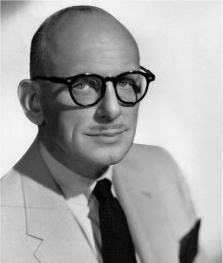
Western Gunfighters is the name of two American Western-anthology comic book series published by Marvel Comics and its 1950s forerunner, Atlas Comics.

The Apache Kid is a fictional Old West character in the Marvel Comics universe, mostly seen in stories from Marvel's 1950s precursor, Atlas Comics. This character was named after, but is unrelated to, the real-life Native American man known as The Apache Kid (Haskay-bay-nay-natyl).

Fawcett Comics, a division of Fawcett Publications, was one of several successful comic book publishers during the Golden Age of Comic Books in the 1940s. Its most popular character was Captain Marvel, the alter ego of radio reporter Billy Batson, who transformed into the hero whenever he said the magic word "Shazam!".

Alfonso Williamson was an American cartoonist, comic book artist and illustrator specializing in adventure, Western and science-fiction/fantasy.

John Powers Severin was an American comics artist noted for his distinctive work with EC Comics, primarily on the war comics Two-Fisted Tales and Frontline Combat; for Marvel Comics, especially its war and Western comics; and for his 45-year stint with the satiric magazine Cracked. He was one of the founding cartoonists of Mad in 1952.
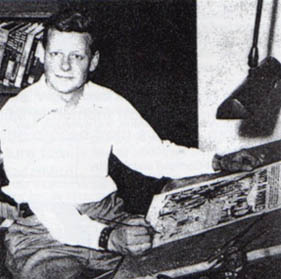
Graham J. Ingels was a comic book and magazine illustrator best known for his work in EC Comics during the 1950s, notably on The Haunt of Fear and Tales from the Crypt, horror titles written and edited by Al Feldstein, and The Vault of Horror, written and edited by Feldstein and Johnny Craig. Ingels' flair for horror led EC to promote him as Ghastly Graham Ingels, and he began signing his work "Ghastly" in 1952.

Richard Bache "Dick" Ayers was an American comic book artist and cartoonist best known for his work as one of Jack Kirby's inkers during the late-1950s and 1960s period known as the Silver Age of Comics, including on some of the earliest issues of Marvel Comics' The Fantastic Four. He is the signature penciler of Marvel's World War II comic Sgt. Fury and his Howling Commandos, drawing it for a 10-year run, and he co-created Magazine Enterprises' 1950s Western-horror character the Ghost Rider, a version of which he would draw for Marvel in the 1960s.
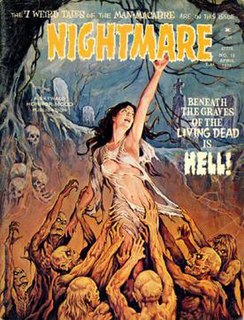
Skywald Publications was an American publisher of black-and-white comics magazines, primarily the horror anthologies Nightmare, Psycho, and Scream. It also published a small line of comic books and other genre magazines.
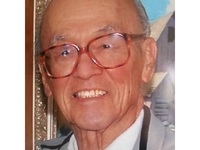
Fred Kida was a Japanese-American comic book and comic strip artist best known for the 1940s aviator hero Airboy and his antagonist and sometime ally Valkyrie during the period fans and historians call the Golden Age of Comic Books. He went on to draw for Marvel Comics' 1950s iteration, Atlas Comics, in a variety of genres and styles, and then again for Marvel superhero titles in the 1970s. He drew the company's The Amazing Spider-Man newspaper comic strip during the early to mid-1980s. Kida also assisted artist Dan Barry on the long-running strip Flash Gordon from 1958 to 1961 and then again from 1968 to 1971.
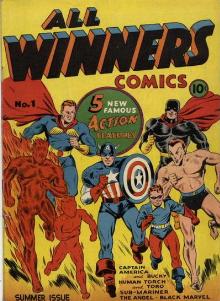
All Winners Comics was the name of two American comic book series of the 1940s, both published by Marvel Comics' predecessor, Timely Comics, during the period fans and historians call the Golden Age of Comic Books. A superhero anthology comic in both cases, they variously featured such star characters as Captain America, the original Human Torch, and the Sub-Mariner. All Winners Comics was also the venue for two full-length stories of Marvel's first superhero team, the (hyphenated) All-Winners Squad.
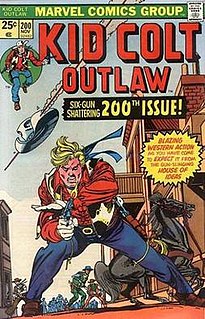
Kid Colt, Outlaw is a comic book title featuring the character Kid Colt originally published by Atlas Comics beginning in 1948 and later Marvel Comics.
Howard Peter "Pete" Tumlinson was an American comic book artist whose work appeared from the late 1940s through the 1950s in titles published by the Marvel Comics predecessors Timely Comics and Atlas Comics, and a book illustrator. His comics work includes most of the early stories of the Western hero Kid Colt.
Notable events of 1954 in comics. See also List of years in comics.

Boys' Ranch was a six-issue American comic book series created by the veteran writer-artist team of Joe Simon and Jack Kirby for Harvey Comics in 1950. A Western in the then-prevalent "kid gang" vein popularized by such film series as "Our Gang" and "The Dead End Kids", the series starred three adolescents—Dandy, Wabash, and Angel—who operate a ranch that was bequeathed to them, under the adult supervision of frontiersman Clay Duncan. Supporting characters included Palomino Sue, Wee Willie Weehawken, citizens of the town Four Massacres, and various Native Americans, including a fictional version of the real-life Geronimo.

Jay Scott Pike was an American comic book artist and commercial illustrator known for his 1950s and 1960s work for Marvel Comics and DC Comics, advertising art, and as a good girl artist. He created the DC character Dolphin and co-created the Marvel character Jann of the Jungle.

Western comics is a comics genre usually depicting the American Old West frontier and typically set during the late nineteenth century. The term is generally associated with an American comic books genre published from the late 1940s through the 1950s. Western comics of the period typically featured dramatic scripts about cowboys, gunfighters, lawmen, bounty hunters, outlaws, and Native Americans. Accompanying artwork depicted a rural America populated with such iconic images as guns, cowboy hats, vests, horses, saloons, ranches, and deserts, contemporaneous with the setting.

Gunsmoke Western was an American comic book series published initially by Atlas Comics, the 1950s forerunner of Marvel Comics, and then into the 1960s by Marvel. A Western anthology that ran 46 issues, it featured early stories of the Marvel Old West heroes Kid Colt and the Two-Gun Kid, and work by such artists as Jack Kirby, John Severin, Joe Maneely, Doug Wildey, and many others.
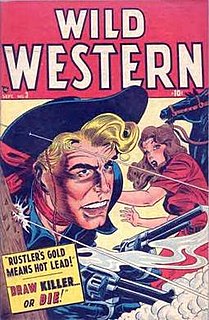
Wild Western was a Western comic book series published by Atlas Comics, the 1950s forerunner of Marvel Comics. The omnibus series published 57 issues from 1948 to 1957. Kid Colt stories were usually the lead feature and a prominent cover element throughout the series' run, while most issues also featured the Two-Gun Kid and the Black Rider. Other recurring characters included Tex Taylor, Arizona Annie, the Apache Kid, and the Ringo Kid.

Alden Spurr McWilliams generally credited as Al McWilliams and A. McWilliams, was an American comics artist who co-created the first African-American lead character of a comic strip. He won the National Cartoonists Society's 1978 award for Comic Book: Story.
